
Clutching a bunch of white roses and hydrangeas, Amy Stevenson stood amid the hundreds of thousands of mourners crammed onto the Royal Mile.
“They are actually my wedding bouquet. I thought it would be nice to bring them up and lay them for the Queen,” she explained.
Ms Stevenson, nee Manchini, who had got married on Sunday at Portobello Beach near Edinburgh, explained that she had chosen the colour white to “represent our loved ones that had passed”.
She stood patiently among the surging crowd, in which people were packed so tightly together that they couldn’t move up or down the street. They waited and then watched in near silence for the Queen’s coffin to pass by, followed by her children – King Charles III, the Princess Royal, Prince Andrew and Prince Edward.
Camilla, the Queen Consort, and Sophie, the Countess of Wessex, followed the hearse in a car as the coffin of the late monarch was driven from the Palace of Holyroodhouse to St Giles’ Cathedral to lie in state before being taken to London.
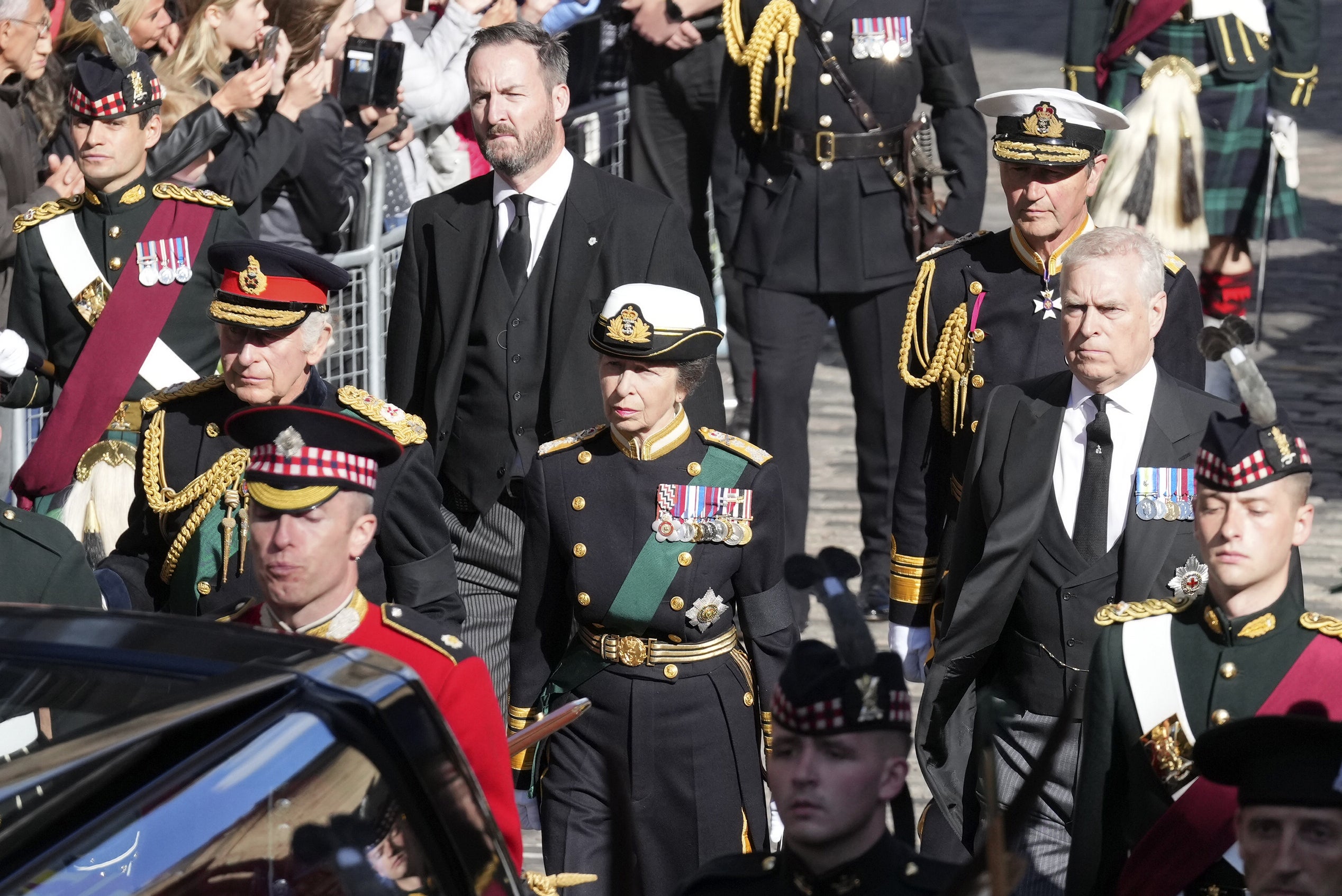
It was the most public part of a long day for the grieving King. After addressing both houses of parliament in Westminster in the morning, he was driven to RAF Northolt to fly to Edinburgh, where the royal procession continued through the streets to the Palace of Holyroodhouse.
After the solemn parade up the Canongate and High Street to St Giles’, there was a memorial service, after which the King and the Queen Consort travelled back down the Royal Mile to the Scottish parliament, where they were addressed by all five political party leaders. The King made his first address to the parliament in a speech that quoted Robert Burns.
Later, the royals travelled back up to St Giles’ to stand vigil at the Queen’s coffin in solemn silence, as the first of thousands of wellwishers passed through the cathedral to pay their respects.
It was a similarly long day for the crowds in the Scottish capital. Under the blazing sunshine, wellwishers including tourists from around the world were thrust together along the procession route, where they had gathered for a glimpse of history in the making. Even for those who were working, there was a sense that this was an important communal experience.
A G4S steward, who was helping to manage the crowds, loaded the live-stream of the procession onto her phone in order to narrate its progress to those patiently waiting. “We are moving, guys, we are moving,” she declared, adding: “I’m doing a service to the people.”
A NewsHub TV presenter from New Zealand, Patrick Gower, who was there to film the procession, took photos for a group of women who had come from Glasgow and Edinburgh.
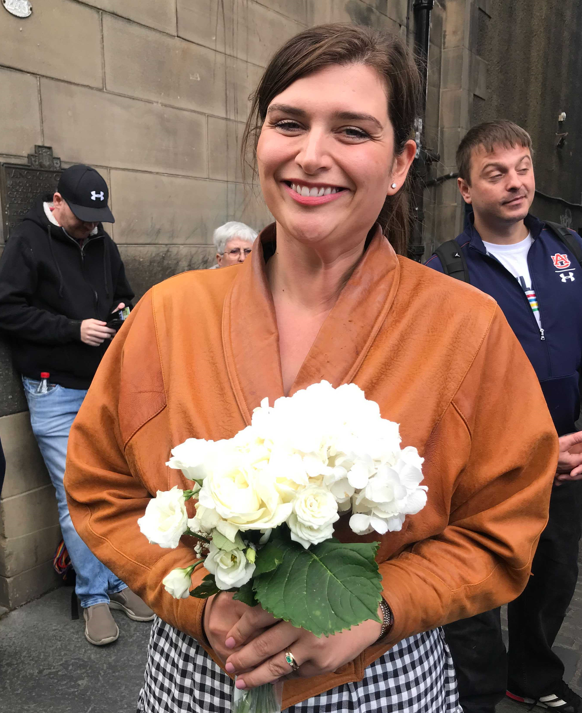
Wilma, who had organised the day out for the group, said they had wanted to come and show their respects. “Many people speak and they don’t follow up with actions, but the Queen was right on it,” she said.
She had been waiting on the Royal Mile with friends Fiona, Elizabeth Ray, and Margaret from 11am. “My mother named me Elizabeth R after the Queen. I’m here for my mum as well as myself,” Elizabeth said.
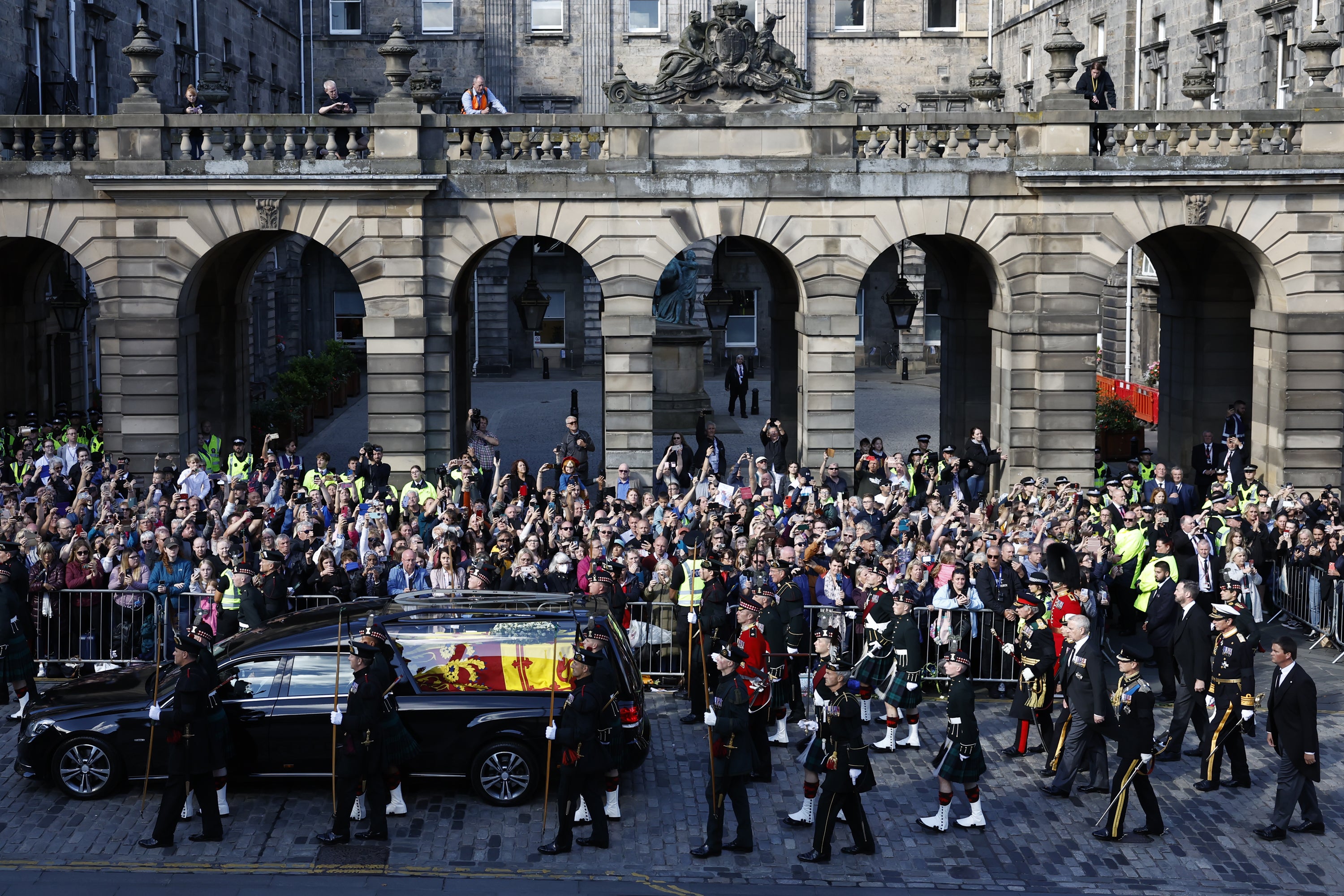
Residents, along with people in hotel rooms that overlooked the street, hung out of their windows in anticipation of the procession going past. Guns began to go off every minute to mark the movement of the convoy as it inched ever closer.
Eventually the crowd grew silent as they caught a glimpse of two mounted police officers who were leading the cortege. A polite smattering of applause broke out as the hearse finally approached and the royal family solemnly processed past.
The procession featured the bearer party, consisting of service personnel from the Royal Regiment of Scotland, flanking the hearse. They in turn were flanked by members of the King’s Bodyguard for Scotland.
All those in the procession walked in step, moving from side to side as one, within touching distance of the coffin, which was draped in the royal standard of Scotland with a wreath of Balmoral flowers on top.
The silence was broken at one point by a woman who called out “God bless the Queen” a number of times, while at least one heckler shouted at Prince Andrew before being dragged away by police and angry passers-by.
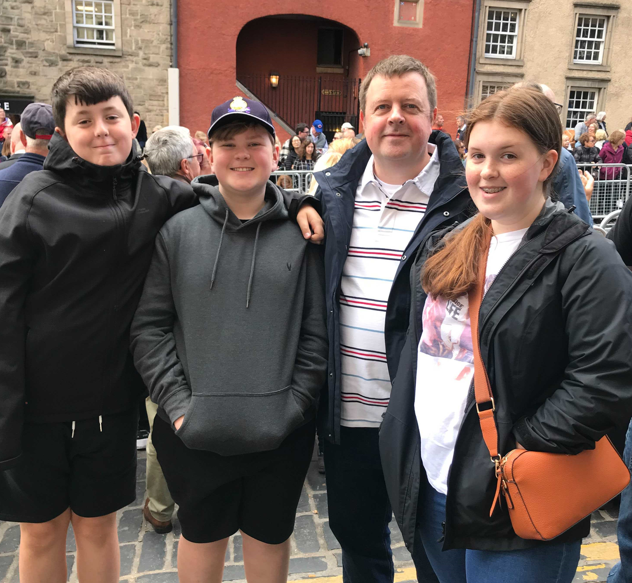
It was a “history being made” for IT technician Derek Fraser, 50, who had brought his son, his daughter, and his son’s friend to watch the procession.
They had got the bus on Monday morning from Falkirk, and found a position by the barriers at around 11am. “My daughter is hoping to study history at university, and I wanted her to be here,” said Mr Fraser.
“It’s a very special moment in time. It’s hard to think of what it’ll be like without her,” said his daughter Brooke, 15.
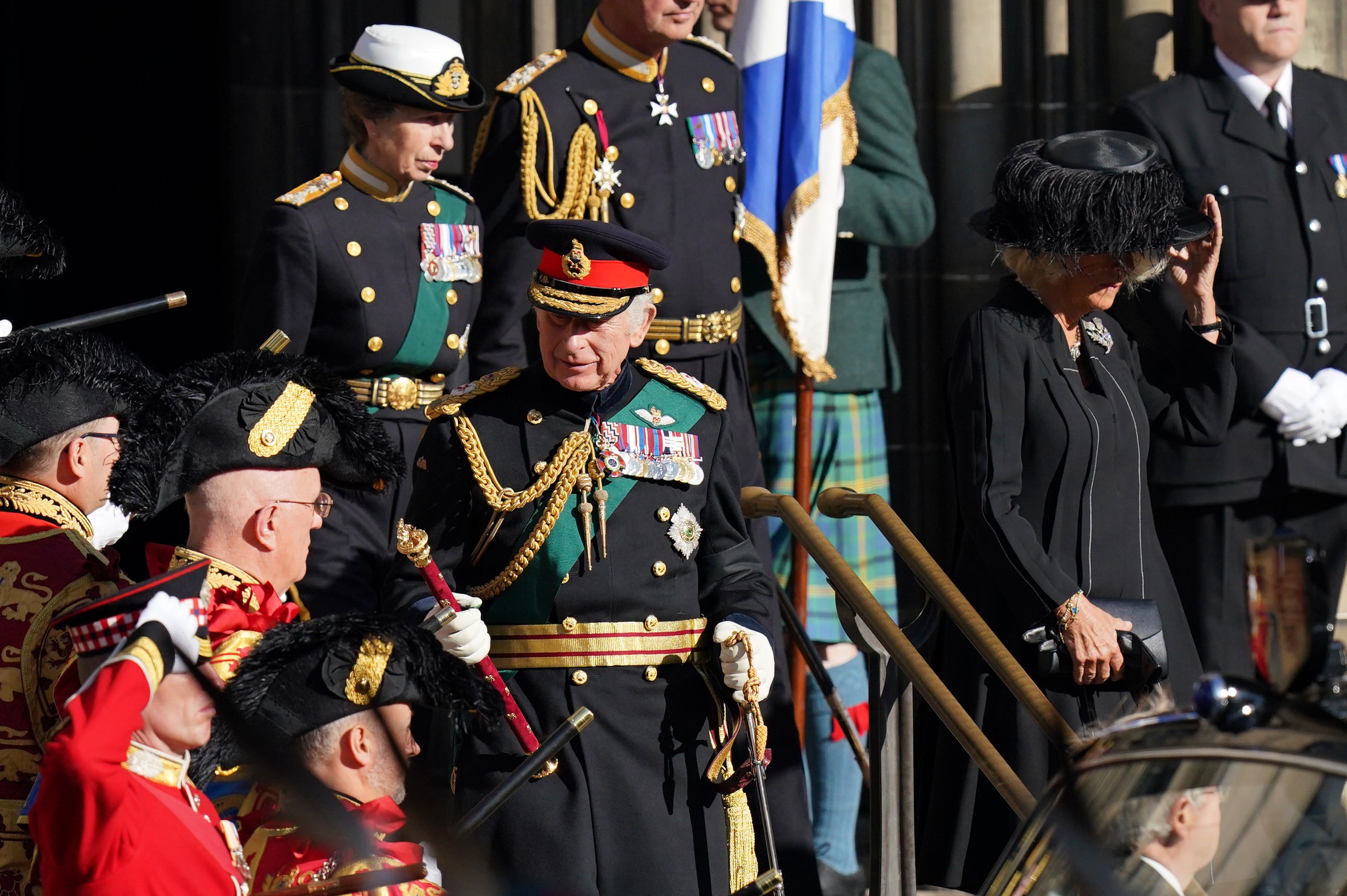
Irene Hamilton, 77, and Shona McManaus, 80, had packed bread rolls filled with Applewood smoked cheese, a box of dates, and some water to keep them going throughout the day.
“If we really get weak, I’ve got Twirls,” said Ms Hamilton, pulling the chocolate bars out of her handbag.
Ms McManaus’s son was driving one of the cars in the procession, and the sisters were hoping to catch sight of him as well as the royals.
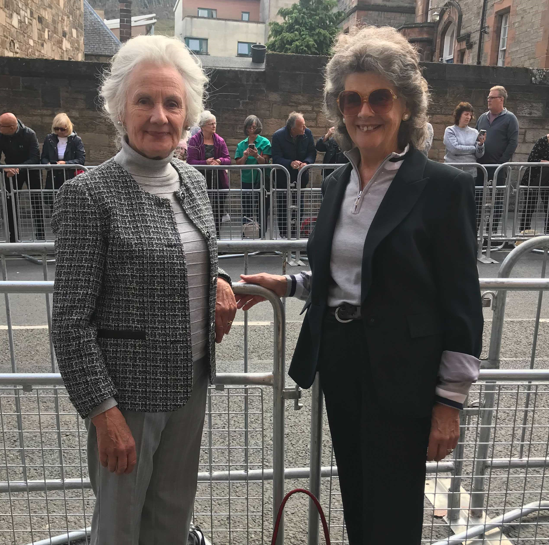
“There is so much touring, and changing, and going to different places. Charles and Camilla must be exhausted, and I take my hat off to them,” Ms Hamilton added.
“The whole thing is just incredible,” Ms McManaus said. She recalled how her aunt had spent some time as a nurse at Buckingham Palace, saying: “She said Andrew and Edward used to chase each other round the corridors of the palace when they were young.”
Alfonso Ramirez, 60, and Beth Willman, 60, self-proclaimed royalists from Colorado, were in Edinburgh to celebrate their 30th wedding anniversary.
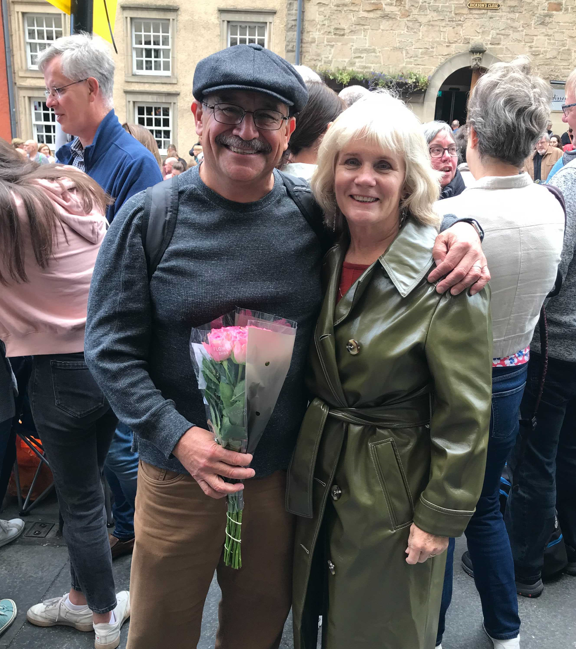
“She was just such a classy woman. The Queen of the world,” Mr Ramirez said. The couple had changed their plans so that they could travel on to Balmoral castle to lay flowers. “It’s a once in a lifetime experience,” Mr Ramirez said.
The Queen’s coffin will now lie in rest at St Giles’ Cathedral before being flown to London on Tuesday afternoon.
Debbie MacDonald, 45, and Joann Brown, 52, were determined that they would make it in to the cathedral to pay their respects.
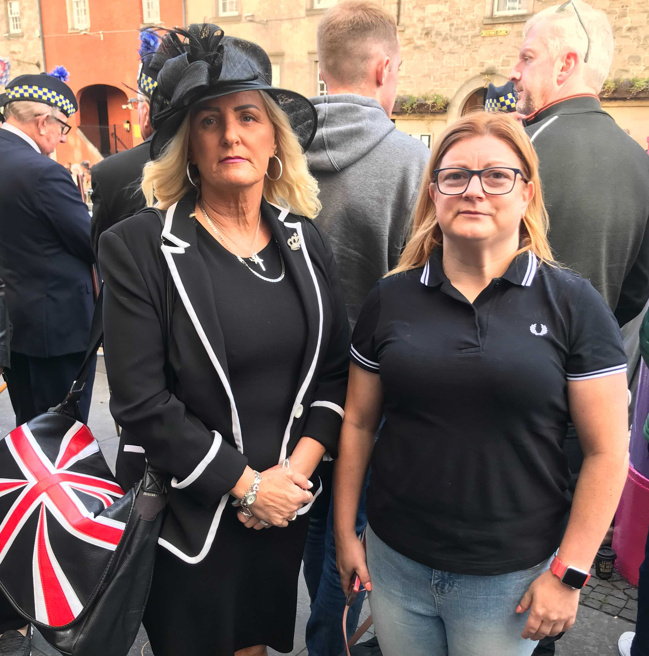
“We will be staying if needs be till midnight. We will not be moving until we have been into St Giles’,” Ms Brown said.
“We want to reflect what a fantastic role model and inspirational woman she really was. She was our defender of the faith,” she added. “We will never ever see the likes of Her Majesty again.”
Inside St Giles’, the Reverend Calum MacLeod welcomed the royal family, calling them “representatives of our nation’s life”, and spoke of “people whose lives were touched by the Queen in so many unforgettable ways”.
He said: “We gather to bid Scotland’s farewell to our late monarch, whose life of service to the nation and the world we celebrate. And whose love for Scotland was legendary.”
The Reverend Dr Greenshields, moderator of the General Assembly of the Church of Scotland, delivered the homily. He said of the Queen: “She was determined to see her work as a form of service to others, and she maintained that steady course until the end of her life.”
The senior minister added: “And although sometimes buffeted by events around her, she continued resolutely and cheerfully to fulfil her responsibilities. And so today we give thanks not only for the length of her reign, but for the qualities she displayed so steadfastly.”
At the Scottish parliament, the new King also praised his mother’s life of “incomparable service”.
“If I might paraphrase the words of the great Robert Burns, my dear mother was the friend of man, the friend of truth, the friend of age and guide of youth,” he said.
“Few hearts like hers, with virtue warm’d; few heads with knowledge so inform’d.”
The quote was taken from Burns’s poem “Epitaph on My Own Friend”.







